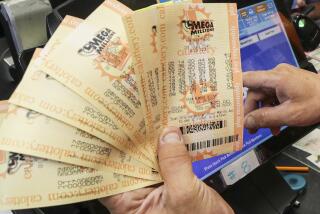Wanted: A $1.2-Million Bird in the Hand
- Share via
F ree money.
See? It worked. You’re still reading, aren’t you?
Upon that sound theory of human behavior, employees of a Glendale-area aerospace company formulated a proposal: their winning California lottery ticket--worth $3.061 million paid over 20 years--in exchange for cash up front--$1.2 million or best offer--paid in full right now.
Interested?
Of course, there is a catch. These people are not Santas with plastic pocket liners; this is no goofy act of beneficence for some deserving millionaire. It is a hard-nosed, gilt-edged calculation. Because a $3-million Lotto ticket is not $3 million; it is the promise that if you and the lottery survive 20 years, you receive a check for about $122,400 each of those years, eventually totaling $3 million minus taxes.
“You’re talking about money then versus money now,” adjudges Jim, a supervisor at the firm, the biggest shareholder in the winning ticket, and the whiz who put the numbers together with his home computer and a lottery handicappers’ newsletter. And he is not about to have his last name in print until this business is concluded.
Most of the shareholders had been playing Jim’s computerized pool for some months when this one came in big on Nov. 16. The winner was the 72nd combination among the 258 tickets Jim had bought at a North Hollywood liquor store.
Now anyone who can play the lottery adroitly enough to prevail against the odds can also figure the chances that over the next 20 years much could come to pass: The lottery fund could go belly-up. The Big One might take some of the winners and the state’s economy with it. A loaf of Wonder bread could wind up costing 10 bucks. And if you want to get apocalyptic about it, nuclear winter could make those six-figure checks less valuable than the handful of kitchen matches it would take to set them afire.
“Who knows?” says Jim, who holds six shares that will be worth $300,000-plus after the sale. “We might not even be here in 20 years and I don’t want to leave it to the dinosaurs.”
Small Payoffs Seen
And with the amount divided among about two dozen people at the company who hold full shares, multiple shares, even fifths of shares, the payoff could mean as piddling an amount as $1,000 a year to some of them.
Hence Jim handed out ballots at work last week so all could vote on what they wanted to do--wait or collect now. He had figured the math six ways from Christmas (“It’s a good crash course in business and finance”) and, given the small pot and the big pool of winners, “they voted that what they wanted to do (was) to sell,” to settle for a lump sum, to take the bird in the hand and forget those two in the bush, even if they would lay golden eggs for 20 years. It all seems to be on the up-and-up, say the lottery people, for whom this is something new. The still-unsigned ticket, locked away in a bank, is negotiable as a bearer bond; whoever endorses it owns it.
“We pay the bearer of the ticket,” says lottery spokesman John Schade, who points out that the sellers at the aerospace company “would be subject probably to both state and federal income taxes because it would be a profit.”
Calls Have Rolled In
In the meantime, since Jim ran a classified ad (“SERIOUS INQUIRIES ONLY”), oh, how the calls have rolled in:
From a man in St. Louis. From doctors and lawyers and investment firms. From the mayor pro tem of a local city. From a soi-disant producer (three calls) who wants to parlay it into a major motion picture, sweetie, probably with heavy gross points. Dozens of calls and a few eager bids, the latest $1.22 million and a gold Rolex. Jim says he expects to have a deal struck by this weekend.
As they say in the realm of haute finance, if you have to ask, you can’t afford it, and it takes money to make money and all that. It is not worth it to the average guy, says Jim, to borrow money to buy the ticket. This venture is for “somebody with a lot of liquid assets and a lot of tax write-offs.”
Roy Weitz is executive director of the American Assn. of Personal Financial Planning in Woodland Hills, and at first look, he says, the deal is a real bargain to a buyer, nearly $250,000 cheaper than a similar annuity could cost.
Could Be Undervalued
To acquire such an annual income from, say, an insurance company, would cost about $1.5 million. “If they’re willing to sell (the ticket) for a million two, I would say that’s undervalued. . . . What they can do with that $1.2 million is much less than what they could do if they kept the ticket intact (for two decades) and divided up the annuity,” Weitz says.
On the other hand, he added, when you mix in two dozen shareholders and parts of shares, and the cost of some agency handling the pay-out every year, “this is a clean solution, (and) when you do something simple, you pay a price for that.”
Not that it ever occurred to Jim, but he could have been among the idle rich, too; a couple of fellow pool winners have taken him aside and confided that “if that had been me (holding the ticket), I’d have taken the money and gone to Tahiti.”
More to Read
Inside the business of entertainment
The Wide Shot brings you news, analysis and insights on everything from streaming wars to production — and what it all means for the future.
You may occasionally receive promotional content from the Los Angeles Times.











